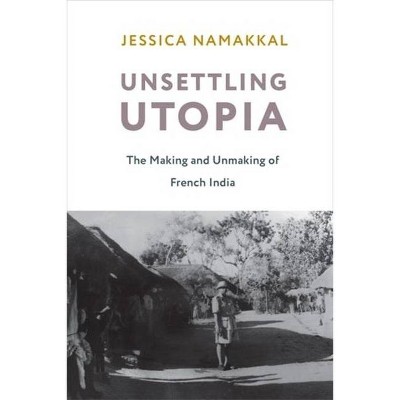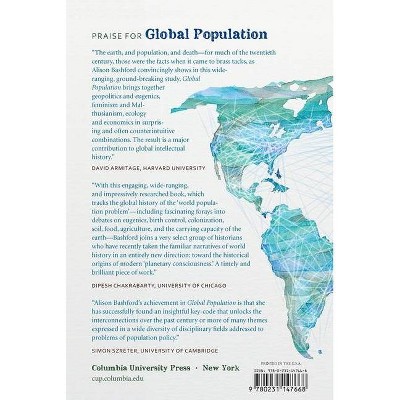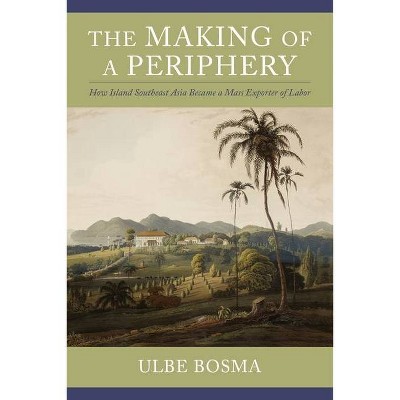Unsettling Utopia - (Columbia Studies in International and Global History) by Jessica Namakkal (Hardcover)

Similar Products
Products of same category from the store
AllProduct info
<p/><br></br><p><b> About the Book </b></p></br></br>After India achieved independence from the British in 1947, France retained control of five scattered territories until 1962. <i>Unsettling Utopia</i> presents a new account of the history of twentieth-century French India to show how colonial projects persisted beyond formal decolonization.<p/><br></br><p><b> Book Synopsis </b></p></br></br>After India achieved independence from the British in 1947, there remained five scattered territories governed by the French imperial state. It was not until 1962 that France fully relinquished control. Once decolonization took hold across the subcontinent, Western-led ashrams and utopian communities remained in and around the former French territory of Pondicherry--most notably the Sri Aurobindo Ashram and the Auroville experimental township, which continue to thrive and draw tourists today. <p/><i>Unsettling Utopia</i> presents a new account of the history of twentieth-century French India to show how colonial projects persisted beyond formal decolonization. Through the experience of the French territories, Jessica Namakkal recasts the relationships among colonization, settlement, postcolonial sovereignty, utopianism, and liberation, considering questions of borders, exile, violence, and citizenship from the margins. She demonstrates how state-sponsored decolonization--the bureaucratic process of transferring governance from an imperial state to a postcolonial state--rarely aligned with local desires. Namakkal examines the colonial histories of the Aurobindo Ashram and Auroville, arguing that their continued success shows how decolonization paradoxically opened new spaces of settlement, perpetuating imperial power. Challenging conventional markers of the boundaries of the colonial era as well as nationalist narratives, <i>Unsettling Utopia</i> sheds new light on the legacies of colonialism and offers bold thinking on what decolonization might yet mean.<p/><br></br><p><b> Review Quotes </b></p></br></br><br><i>Unsettling Utopia</i> is a fascinating book on the postcolonial history of French India as well as a provocative analysis of the structural relationships among colonial settlement, utopian thinking, and the incompleteness of decolonization. Namakkal's immense effort to engage the far-flung transnational archives of French India inform this important book and the revealing light it sheds on the messy history of French imperialism in southern India and its spatial, social, and spiritual afterlives.--Tariq Jazeel, author of <i>Sacred Modernity: Nature, Environment, and the Postcolonial Geographies of Sri Lankan Nationhood</i><br><br>Exploring the decolonization of French India, Namakkal's lucid and innovative book brings together the history of state-led decolonization and the creation of utopias to reveal how both projects relied on regimes of labor, erasure, and territorial expansion that had much in common with the colonizing project. Engaging, ambitious, and deeply researched, <i>Unsettling Utopia</i> brings new and important insights to our understanding of the temporal boundaries of colonialism and decolonization.--Danna Agmon, author of <i>A Colonial Affair: Commerce, Conversion, and Scandal in French India</i><br><br>Jessica Namakkal's excellent book reveals hidden layers of Pondicherry's feigned decolonization and ongoing recolonization. This tour de force is the kind of book you don't want to finish; it keeps you right on the edge of your seat, avidly turning the pages for more.--Ari Gautier, author of <i>Le Thinnai</i><br><p/><br></br><p><b> About the Author </b></p></br></br>Jessica Namakkal is assistant professor of the practice in international comparative studies; gender, sexuality, and feminist studies; and history at Duke University.
Price History
Price Archive shows prices from various stores, lets you see history and find the cheapest. There is no actual sale on the website. For all support, inquiry and suggestion messagescommunication@pricearchive.us


















